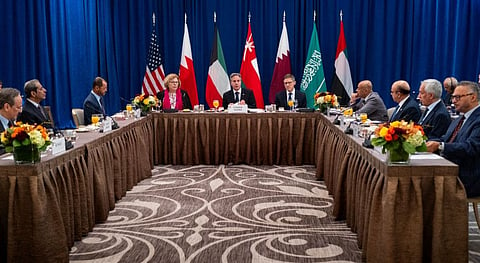Gulf Cooperation Council countries, US urge Iran to fully cooperate with IAEA
Iran barred inspectors assigned to oversee Tehran’s atomic activities

CAIRO: Gulf Cooperation Council (GCC) countries and the US renewed calls for Iran to fully cooperate with the International Atomic Energy Agency (IAEA), the countries said in a joint statement.
The statement came after a meeting of the GCC Arab foreign ministers, the US Secretary of State and GCC Secretary-General in New York.
Iran barred multiple International IAEA’s inspectors assigned to oversee Tehran’s atomic activities in a move described by the UN nuclear watchdog chief, Rafael Grossi, as “disproportionate and unprecedented.”
Iran’s move was a response to a call led by the United States, Britain, France and Germany at the IAEA’s Board of Governors meeting last week for Tehran to cooperate immediately with the IAEA on issues including explaining uranium traces found at undeclared sites.
Iran demands US show goodwill
Earlier, Iranian President Ebrahim Raisi, in a speech at the UN General Assembly, said that the United States should prove its “goodwill and determination” to revive Tehran’s 2015 nuclear pact as months of indirect talks between the long-time foes have led nowhere.
“By exiting the JCPOA, the United States violated the agreement and the principle of good faith. America should demonstrate its goodwill and determination,” Raisi said, referring to the Joint Comprehensive Plan of Action between Tehran and six world powers.
Former US President Donald Trump reneged on that deal in 2018, arguing it was too generous to Tehran, and restored harsh US sanctions on Iran, prompting Tehran to gradually violate the agreement’s nuclear limits.
After taking office in January 2021, US President Joe Biden tried to negotiate a revival of the nuclear pact under which Iran had restricted its nuclear programme in return for relief from US, European Union and UN sanctions.
But months of nuclear talks have stalled since last September, with both sides accusing each other of demanding excessive concessions.
“America must build trust to demonstrate its good intentions and genuine willingness to fulfil its commitments and conclude the path,” Raisi said.
US and European officials have been searching for ways to curb Tehran’s nuclear activities since the breakdown of indirect American-Iranian talks a year ago.
To cool tensions, Tehran and Washington reached a Qatar-mediated deal last month, which resulted in swapping five detainees each on Monday and involved releasing $6 billion of Tehran’s funds in South Korea.
Further straining already difficult ties, the United States and its Western allies have imposed sanctions on Iran over its handling of months of protests sparked by the death in custody of young Iranian Kurdish women Mahsa Amini.
Israel envoy walks out
Immediately after Iran’s Raisi began to deliver his speech, Israel’s envoy to the UN, Gilad Erdan, marched out of the General Assembly hall while waving Amini’s picture.
“I left the speech to make it clear that the State of Israel stands by the Iranian people,” said Erdan, according to a statement sent to Reuters by Israel’s mission to the United Nations.
Iran and Israel, which Tehran refuses to recognise, have been locked in a shadow war for decades, with mutual allegations of sabotage and assassination plots.


